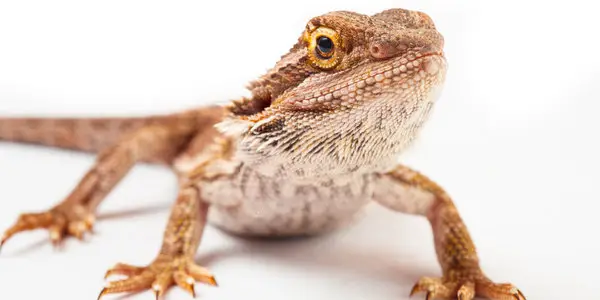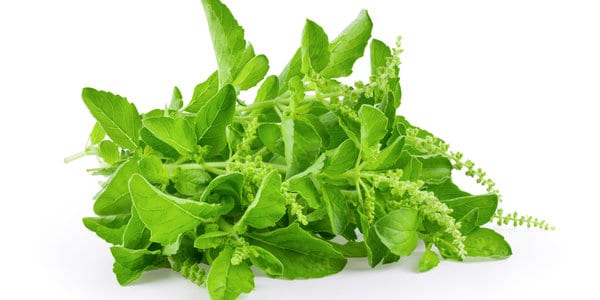Yes, bearded dragons can eat basil. It is packed with plenty of nutrients, minerals, and vitamins that are vital to the growth and development of your beardie. The components also boost its immunity and digestion. Thus, it is safe and good to feed your bearded dragon with basil, only that you need to do so in moderation.
Basil is a culinary herb used in several cuisines. It is not toxic to bearded dragons, but it should not comprise a staple part of its diet. Here, we get to explore the nutritional value of the basil, among other things you need to know.
Basil’s Nutritional Value
Basil is a suitable herb for bearded dragons, and there are good reasons for this. Let us look at the nutritional component of these minerals for 100g of basil.
| Item | Nutritional value per 100 g |
| Water | 92.06 g |
| Proteins | 3.15 g |
| Fiber | 1.6 g |
| Energy | 94 kJ |
| Calcium | 177 mg |
| Potassium | 295 mg |
| Fat | 0.64 g |
| Magnesium | 64 mg |
| Iron | 3.17 mg |
| Sodium | 4 mg |
| Manganese | 1.148 mg |
| Zinc | 0.81 mg |
| Vitamin C | 18 mg |
| Vitamin K | 414.80 ug |
| Vitamin E | 0.8 mg |
Benefits of Basil to Bearded Dragons
Rich In Calcium
Calcium plays a vital role in a bearded dragon. It prevents metabolic bone disease while ensuring that your pet has healthy and strong bones. Its deficiency can severely affect your pet to the extent of death.
As such, you need to ensure that your bearded dragon gets enough calcium from its diet. You can also provide it with calcium supplements to bridge any deficit.
The good thing is that basil is rich in calcium, so your pet will get this vital mineral every time to feed it with the herb. On average, a 100 g pack of basil contains about 177 mg of calcium.
Suitable Calcium: Phosphorus Ratio
Calcium and phosphorus minerals are both vital for a bearded dragon. However, high phosphorus binds calcium, thereby hindering its absorption.
For this reason, experts recommend calcium to phosphorus ratio of not less than 2:1. Such amounts ensure that your lizard is still left with enough calcium to be absorbed into the bloodstream.
Basil has a calcium to phosphorus ratio of 3:1, therefore, meeting the basic requirements.
It is worth noting that phosphorus is not all detrimental to a bearded dragon. It serves a great role in supporting the growth and density of a bearded dragon’s bones and teeth.
Hydrating
Water is a major component in basil, and as with all animals, hydration is very important. By giving your beardie basil, you also keep it hydrated, which means that it will have better digestion, and its skin will remain supple.
Some of the major signs of dehydration in bearded dragons include sunken eyes, lethargy, lack of appetite, and wrinkled skin.
Basil can help prevent this by improving the lizard’s water intake. In addition, it comes in handy if your pet beardie does not like drinking water.
High Vitamin K Levels
The vitamin helps with blood clotting and also aids bone development. It also helps with Calcium absorption.
It has Vitamin C
Vitamin C is necessary for an animal’s health and boosts the immune system. Low immunity makes animals, including bearded dragons, more susceptible to infections and illnesses.
As such, basil is an excellent addition to the animal’s diet since it helps boost Vitamin C intake.
Disadvantages of Basil for Bearded Dragons
Acidic
Basil is acidic because it has items such as rosmarinic, caftraric, and chicoric acid. Excess acidity causes stomach upsets and digestion problems in bearded dragons.
Other Safe Herbs for Bearded Dragons
In addition to basil, there are a few other herbs that are also good for your bearded dragon. They are easy to find, making it easier for you to feed the pet.
In addition, you will find most of them in your local grocery store, and they are often inexpensive. Here are some of the other common herbs that are safe for bearded dragons.
1. Thyme
Thyme is common in most kitchens. Although it is not often fed to beardies, it is a good addition to their diet. The herb has anti-bacterial properties, thus making it effective in combating parasites and bacteria.
2. Lavender
Lavender has soothing benefits to the body, which is why it is common in aromatherapy. Your beardie will also benefit from this herb thanks to them being vitamins and calcium-rich.
3. Cilantro
Cilantro is high in vitamins such as A, C, and K. Cilantro also has antioxidants, making it quite beneficial for a bearded dragon.
4. Dill Leaves
Dill belongs to the parsley, carrots, and celery family. It is a herb with fern-like leaves commonly used as an aromatic culinary herb.
It is rich in calcium, potassium, folate, magnesium, manganese, Vitamins A and C. All these nutrients are an essential part of helping you keep the bearded dragon healthy.
Even so, the high Vitamin A content can be toxic if you give your beardie too many dill leaves.
Other safe herbs for a bearded dragon include parsley, sage, oregano, rosemary, and fennel. As with basil, all these herbs should be given to a bearded dragon in moderation.
They do not form a staple part of their diet, but occasionally including them in the lizard’s meal will benefit the reptile.

How To Prepare Basil For A Bearded Dragon?
Feeding a bearded dragon basil is simple. You do not need to cook the herb. Instead, feed them with it when raw and, whenever possible, go for the fresh leaves instead of the dried ones.
Choose the organic ones to ensure that they have minimal chemical and fertilizer residues. Next, thoroughly wash the basil to remove impurities, pesticides, and other toxic residues.
Once clean, chop the basil into tiny pieces to make it easier for the beardie to bite and swallow. You can also put a few whole basil leaves in the beardie’s terrarium and let it tear the leaves for itself.
Basil can be given to a beardie when mixed with other vegetables. Since it has an attractive smell, you can also mix it with foods with unpleasant smells, such as crickets, to mask the smell and encourage the bearded dragon to feed. Either way, your pet will benefit from the nutrients packed in this herb.
Frequently Asked Questions About Bearded Dragon and Basil
Are Dried Basil Leaves Good for Bearded Dragons?
Dried basil leaves have higher nutritional content than fresh leaves. It means that their calcium content is higher, which is good. However, it also means that the dried basils leaves have more sugar and phosphorus than fresh ones, which is not good for bearded dragons.
Therefore, you need to be keener on dried leaves. In addition, dried foods are not found in their natural environment, making dried basil leaves foreign to their stomachs.
Where possible, stick to fresh basil leaves and avoid dried ones. If not possible, ensure to give your bearded dragon fewer basil leaves than you would with dried ones.
Can Bearded Dragons Eat Basil Seeds?
No, bearded dragon should not eat basil seeds. Just like dried basil, basil seeds should be avoided at all costs. They are rich in fat which is not suitable for the reptile. Further, the seeds have a hardy texture, making chewing and digestion hard for the animal.
Can Baby Bearded Dragons Eat Basil?
Yes, baby bearded dragon can eat basil, It is safe to feed your baby bearded dragon with basil but only in moderation and small amounts.
Moderation ensures that you do not expose your beardie to too much intake of the acidic content present in the basil.
On the other hand, small amounts leave room for other plant-based materials such as dandelion greens that play a critical role in providing the lizard with vital nutrients.
How Often Can I Feed My Bearded Dragon With Basil?
The frequency depends on various factors, including the age of the reptile. The amounts and number of times should be lower for baby and juvenile beardies and increase as the reptile matures.
Basil is not a staple diet for the beardie; thus, you need to limit its intake to a few times a week for adult beardies. You can provide younger bearded dragons them with a small amount of basil 4-to 5 times a month.

Conclusion
Basil is not toxic to bearded dragons; you can feed your pet with the herb. However, and as with most other herbs, giving your beardie too much basil can make it sick. Limit its feeding to a few days a week.
In addition, basil should not be the only plant-based food to give your beardie; include other safe herbs and vegetables to ensure that the lizard gets a balanced diet.
